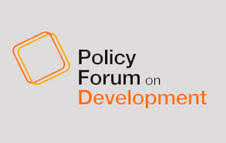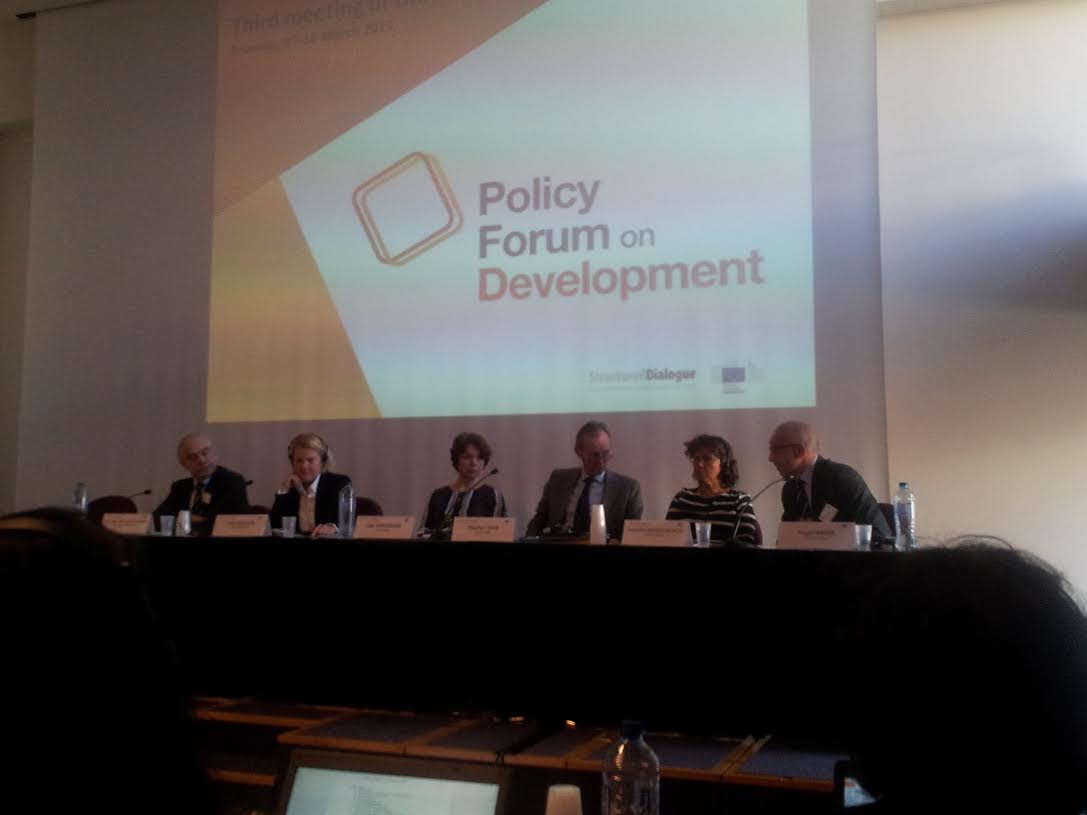
Over 120 representatives from Member States, European institutions, civil society and local authorities from various world regions met to discuss development policies in the third edition of the Policy Forum on Development, held in Brussels from 17 to 18 March.
The opening session included the participation of the representative from Latvia, on behalf of the Presidency of the European Union; the Director General of EuropeAid, Fernando Frutuoso de Melo; the Director for Multilateral Relations and Global Issues of the European Commission’s External Action Service, Stephen Auer; and the two Co‑Presidents of the Forum, Jacqueline Moustache-Belle, Mayor of Victoria (Seychelles) and Co-President of UCLG, representing networks of local authorities; and Jorge Balbis, Executive Secretary of ALOP, representing civil society organizations. The session was chaired by the DG DEVCO Director for Human Development and Migration, Lotte Knudsen.
In the opening ceremony, participants emphasized that 2015 is a key year for the future of humanity. During this year the new development agenda and the agenda for the fight against climate change, as well as funding modalities, will be defined. Fernando Frutuoso de Melo, as host of the Forum, recalled the signing of the strategic partnership among the European Commission, UCLG and the main global and regional networks of local governments, which took place on 28 January. In his address, Stephen Auer emphasized the importance of good governance in the future sustainable development agenda. Meanwhile, the representative for civil society, Jorge Balbis, stressed the need to recognize the transversal nature of human rights in the development agenda, and warned of the magnitude of hope invested in the process and the risks of disappointment.
During the first debate, the European Commissioner for International Cooperation and Development, Neven Mimica, introduced the recent Communication by the Commission on “A global partnership for poverty eradication and sustainable development after 2015”, which presents its position on the means of implementation of the Post-2015 Agenda and the Third International Conference on Financing for Development, scheduled to take place in Addis Ababa in July. In his speech, the Commissioner reaffirmed the commitment of the EU to reach the target of allocating 0.7% of GNP to official development assistance (ODA), and to promote innovative financing mechanisms, including greater cooperation with the private sector to increase the flow of investment for development.
 With regard to local authorities, both the opening speech of Jacqueline Moustache‑Belle and the intervention of the Mayor of Osisterwijk, Hans Janssen, representing PLATFORMA, welcomed the decision of the European Commission to put governance and partnership at all levels – global, national and regional – in a prominent place within the sustainable development agenda. However, at the same time, they also warned against the lack of reference to clear commitments to support local governments in the Communication, such as reforms to taxation and local funding to boost investment in infrastructure and basic services, which are essential to achieving the SDGs and resolving the issues linked to poverty. They also reaffirmed the support of local and regional authorities for Goal 11, on “cities and sustainable, inclusive, safe and resilient human settlements”.
With regard to local authorities, both the opening speech of Jacqueline Moustache‑Belle and the intervention of the Mayor of Osisterwijk, Hans Janssen, representing PLATFORMA, welcomed the decision of the European Commission to put governance and partnership at all levels – global, national and regional – in a prominent place within the sustainable development agenda. However, at the same time, they also warned against the lack of reference to clear commitments to support local governments in the Communication, such as reforms to taxation and local funding to boost investment in infrastructure and basic services, which are essential to achieving the SDGs and resolving the issues linked to poverty. They also reaffirmed the support of local and regional authorities for Goal 11, on “cities and sustainable, inclusive, safe and resilient human settlements”.
The representative of Eurodad, Tove Ryding, raised the key dimensions for governance reforms, which aim to democratize economic institutions, and in particular, gain greater control over tax evasion and illegal flows of money, which drain a mass of resources, much greater than the amount of ODA, from developing countries. Without these reforms, the achievement of the SDGs would be threatened. Speaking on behalf of local authorities, the Mayor of Sabana del Mar (Dominican Republic), Aura Saldana, stressed the need to strengthen the capacities and resources of local governments (fiscal decentralization, access to financial markets, etc.) in order to contribute to the necessary investments in basic infrastructure, both in developing and developed countries.
On the second day, the concept of an “enabling environment” for civil society and local authorities was extensively discussed, and illustrated through examples. The Mayor of Bamako and President of the Association of Municipalities of Mali, Boubacar Ba, presented the conditions that are considered as essential to creating an enabling environment in his country, as a basis for building peace and for the achievement of the Post-2015 development agenda. In particular, he discussed how greater cooperation between civil society and local authorities could be promoted. The conclusions of the day recognized that all actors, including States, need an enabling environment to be able to assume their role in development. It was also highlighted that the basis of cooperation between civil society and local authorities must be based on trust, respect and dignity, as well as on dialogue and mutual accountability, in order to reach a shared vision.
To conclude the two days, the European Commission presented their annual plans for the implementation of thematic programme of local authorities and civil society for 2015-2017. Their first objective concerns support for the project in partner countries. Over the next three years the programme will provide assistance to local authorities in 84 partner countries. Their second objective relates to support for the global networks of local governments. It is under this objective that the strategic partnership was signed among the EC, UCLG, UCLGA, CEMR/Platforma, the AIMF and CLGF.
The Forum was closed by the new Head of Unit, responsible for relations with civil society and local authorities, who expressed a commitment to continue to strengthen this space as a platform for dialogue and exchange.
The First Regional Policy Forum for the Asia Pacific region will be held in June in Bangkok. This Third Forum marks the end of the first cycle, which will be completed by an evaluation of progress and the renewal of all its members.
Stay tunned with the hashtag #GlobalPFD.










